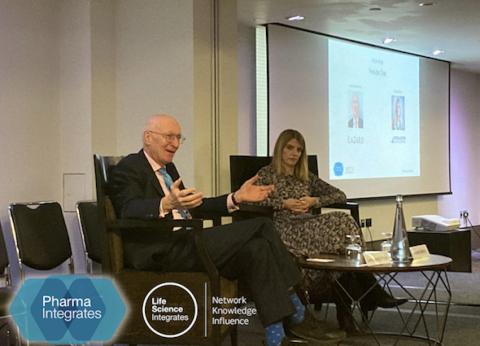
London, United Kingdom, 5th December 2022 / Sciad Newswire / With the UK’s health system under pressure, leaders and innovators from across pharma and healthcare gathered at London Tower Bridge to discuss the future of the sector at the 11th annual Pharma Integrates event.
With nurses voting to strike, cancer waiting lists at an all-time high, and a cost-of-living crisis, the NHS is at crisis point. But armed with an innovative pharma & healthcare sector that saw us through the COVID-19 pandemic, we have the tools, skills, and visions to reform health in the UK and globally. As the flagship event of Life Science Integrates’ calendar, Pharma Integrates saw the brightest minds from industry, academia, policy, and practice gather to discuss the biggest issues of today. With keynote talks, expert interviews, panel discussions, product exhibitions, and networking opportunities, the day focused on big health challenges, new technologies, and industry enablers.
Continuing a long-established partnership with The Association of the British Pharmaceutical Industry (ABPI), Pharma Integrates 2022 was opened by Susan Rienow, ABPI Vice President and UK President of Pfizer. Susan celebrated the fact that the life sciences sector contributes £37 billion a year to UK GDP, providing over 580,000 jobs: “There’s huge potential for our sector to transform both the UK economy and the lives of patients.”
Addressing the increasing pressure on the NHS, Tim Ferris (National Director of Transformation, NHS England and NHS Improvement) and Lord David Prior (former Parliamentary Under Secretary, former NHS England Chairman, and current Deputy Chairman UK & Global Senior Advisor at Lazard) shared their views in exclusive interviews. “The NHS is a sick system in two senses – it cares for people who are already sick, and it’s a failing system,” claimed David, outlining the issues of a budget skewed towards acute care, squeezing capacity for primary care, prevention, and public health education. Discussing areas for improvement, Tim shared insights from his morning commute: “I was looking at ads on the tubes – ‘we use a single platform and that makes everything go faster’ – that’s what we need for the NHS.”
Big Health
Despite progress in the treatment of many conditions, there remain some disease areas with a large unmet clinical need. The Big Health track covered aging, respiratory disease, rare disease, and cancer.
Lord James O’Shaughnessy (Newmarket Strategy) talked about the need for a preventative treatment model for age-related diseases, with a focus on ‘health span’ rather than lifespan. “You can’t cure dementia. But you CAN slow it. I’m absolutely sure we can impact the course of the disease,” stated Giovanna Mallucci (Altos Labs), calling for funding not just from government and charities, but from billionaires, VCs, and people looking to take care of their future health.
On funding, asthma costs the NHS £1.1 billion annually, yet 60% of asthmatics don’t receive the care they need. This means 3 people die a day in the UK from asthma, but 2/3 of these deaths are preventable. Industry experts debated the gaps in asthma treatment, including the poor UK penetration of life-changing biologic therapies, and the need for digital innovation in diagnosis and e-monitoring. “By the time I’ve finished speaking, almost 20 people will have had asthma attacks in the UK. By the time all the panellists have spoken, someone will have died of a lung condition,” commented Sarah Woolnough (Asthma + Lung UK).
While 1 in 5 people in the UK have a respiratory disease, 1 in 17 of us will have a rare disease at some point, yet patient access to breakthrough therapies is limited. Delegates from across the sector agreed that early diagnosis is crucial to saving lives, praising the technological advances in diagnosis and treatment, but noting the accessibility challenges. “We need strategic alignment across healthcare systems to allow patients to truly benefit from innovation,” stated Imran Kausar (Novartis), explaining how bureaucracy and process inhibit progress.
With record cancer delays making news headlines, the track culminated with insights into diagnosis, prevention, and treatment. “There’s been success in cervical, breast and prostate cancer screening programmes, but on the whole, many cancers are still diagnosed at a late stage,” explained Jane Robertson (Redx Pharma). The panel acknowledged our lack of a true antimetastatic drug, but shared hope for the future of personalised medicines. Emma Kinloch (Salivary Gland Cancer UK) gave a patient perspective: “Only patients that are living with cancer can tell you what it means,” she said, advocating for increased use of patient reported outcomes.
Technology
Advances in technology open huge potentials for healthcare, and the Technology track explored possibilities in formulation, sustainability, MedTech, supply chains, and artificial intelligence.
Accelerating formulation is key to reducing time to market, and experts explored new tools and technologies available for candidate selection. “It’s crucial to ensure studies are designed to answer the right questions, right from the start,” said Anke Domdey (Nanoform). With an increasing focus on sustainability, conversation turned to greener initiatives and the repurposing of drugs throughout development. “For a product or company to be successful, it needs to be scalable, sustainable and sellable,” shared Claire Thompson (Agility Life Sciences).
Diving deeper into sustainability, representatives from biotech and big pharma companies, including Pfizer and AstraZeneca, acknowledged the changes being made to reduce environmental impact, but called for greater collaboration and innovation to reach targets. Speakers shared optimism over the opportunity for digital innovation to improve processes and sustainability, but large challenges remain. “We have to ask ourselves how much we value our future planet vs the current health of our population,” commented Jen Baxter (Protium Wales).
One area experiencing digital acceleration is the MedTech sector, which saw large growth driven by the COVID-19 pandemic. Panellists explored the potential of digital technologies to enhance diagnosis, home testing, and help people take control of their health. “In 10 years, we won’t access healthcare as we do today, something’s going to change, and that change is likely to be digital,” said Charlotte Lee-Sinclair (Third Culture Ventures), calling for anyone with an interest in digital therapeutics to connect and collaborate.
Digital technologies also offer the potential to transform supply chains, which are struggling to keep pace with consumer demand, treatments, and health systems. “Government, regulators, and everyone involved needs to understand how NOT digitising supply chains has a direct impact on community well-being and an indirect impact on the cost of looking after communities,” commented Santosh Sahu (Charac), as panellists discussed the pressing need to revolutionise the healthcare supply chain that lags almost 20 years behind other sectors.
Looking to the future, innovators debated whether artificial intelligence is ‘hype, hope, or happening’, touching on potentials in both patient care and drug discovery. Exploring factors slowing uptake, speakers discussed the need to reduce the burden of data cleaning, build patient trust, and adopt appropriate policy: “Having worked in policy making, it’s very reactive rather than proactive,” stated Jessica Morley (Bennett Institute for Applied Data Science, University of Oxford), “more concrete policy action is needed.”
Enablers
Diverse skilled teams, empowered patients, and effective partnerships can enable a better industry, and these themes were the focus of the Enablers track.
Treatments are ultimately about patients, and patient engagement was a key discussion point. Delegates agreed that success does not simply come from creating technologies or treatments, but requires effective engagement with patients to demonstrate the advantages. “Involve patients early and keep them keen,” said Nigel Brokenshire (Bayer PLC), advocating for co-design, co-production, and partnership. However, speakers also highlighted issues of digital poverty and access, calling for inclusivity.
Diversity, equality, and inclusion were debated in detail, with the eye-opening statistic that male chairs and non-exec directors earn on average 107% more than females. Speakers from biotech, big pharma and consulting discussed the importance of true representation, the problems of unconscious bias, and the need to embed diversity into the fabric of an organisation. “Diversity is being invited to the party; inclusion is being invited to dance. How you dance depends on the music (the organisation’s culture),” said Michael George (Labcorp).
From intra-organisation to inter-organisation relationships, conversation turned to the role of CDMOs and CROs. Speakers from big pharma, innovative biotechs, and CDMOs discussed when to partner and what makes partnering successful. Capacity, speed, flexibility, and cost were key priorities addressed by all parties, but the take-home message was the need for clear alignment of objectives. “A strong partnership is when your cultures and visions align,” said Jason Cameron (Orphan Drug Consulting).
The track ended with discussion of the evolving clinical trials landscape, with experts in the field debating the future of decentralised and virtual approaches. Delegates noted the issues of traditional patient recruitment in a population with a growing expectation for virtual involvement, but acknowledged the difficulties of changing processes in a long-established and risk-averse industry. Looking to the future, Christopher Morton (ELEM Biotech) explained his innovative software for performing medical trials on ‘virtual patient populations’ by modelling humans on supercomputers, with speakers advocating for a mixed model approach of virtual tools, decentralised trials, and traditional approaches.
With well-received closing remarks from Trevor Jones (e-Therapeutics, Respiratory Innovation Wales, Ascension Healthcare), the day ended in a networking drinks reception, re-kindling old relationships and sowing the seeds for new partnerships.
“As the 11th annual Pharma Integrates draws to a close, it’s incredible to reflect on how far the industry has come, and I’m excited to see the visions discussed today play out in the future,” said Samuel Thangiah, LSI Executive Director. “Pharma Integrates was the finale of our busiest year yet, with seven events addressing all areas of the sector,” commented LSI Executive Director Christopher Watt, thanking all speakers, partners, sponsors, and delegates. A full event summary and video recordings are available on the Life Science Integrates website, where details of 2023 events will be released shortly.
ENDS
Notes to Editors
About Life Science Integrates
LSI creates strategy-led life science conferences that enable the achievement of business and commercial goals. We create communities of shared commercial and scientific interest for life science leaders based on sustainable relationships of trust, knowledge and understanding.
Our primary audiences are life science leaders operating at C-Suite level, as well as those responsible for strategy, business and science.
For further information, please contact:
Life Science Integrates
Jo Stickings, Marketing and Events Manager
E: jo.stickings@lsi-uk.com
https://www.lifescienceintegrates.com/
Media contact
Dani Edmunds, Darya Shulakova and Paula Burton
E: dani@sciad.com, darya@sciad.com, paula@sciad.com
T: +44 (0) 20 3405 7892
